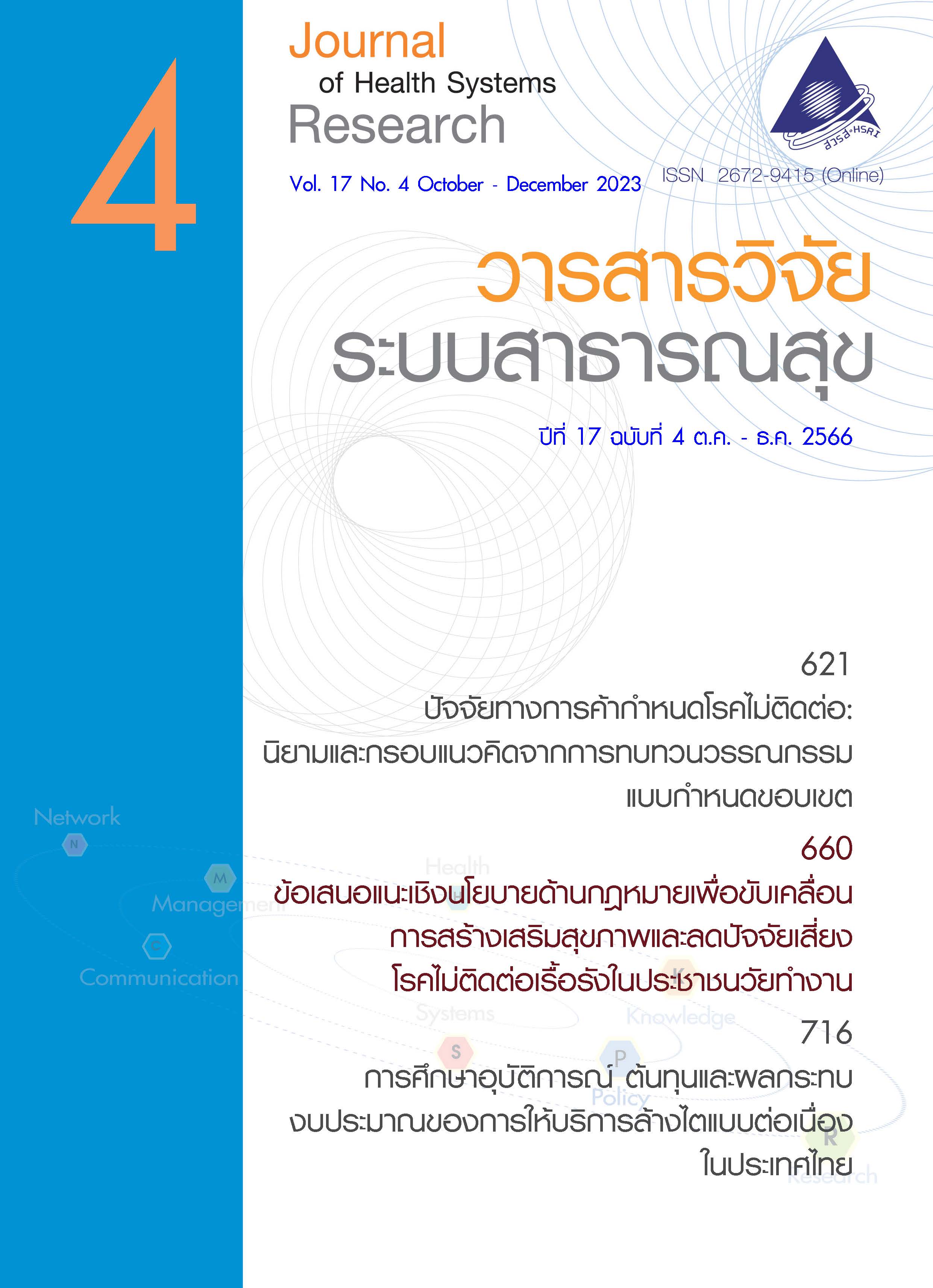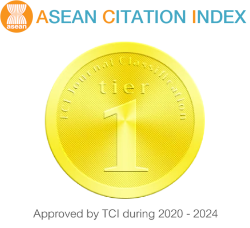Incidence, Cost and Budget Impact of Continuous Renal Replacement Therapy in Thailand
Keywords:
acute kidney injury, continuous renal replacement therapy (CRRT), incidence, unit cost, budget impactAbstract
Background: Acute kidney injury occurs when the kidneys lose their function over hours or days. If a pharmaceutical intervention is not available, renal replacement therapy can play an essential role in increasing patient’s survival chances. Currently, there are four methods of renal replacement therapy, and the preferred method depends on patient’s clinical indications. The most recent continuous renal replacement therapy (CRRT) already included in the benefit package paid by the National Health Security Office (NHSO), has been commented by providers for low reimbursement hence low access.
Objective: The purpose of the study was to analyze the incidence, cost, and budget implications for acute kidney injury patients requiring CRRT.
Methods: Reviews of literature and the NHSO e-claims during 2016-2019 provided incidence cases needed renal replacement therapy, and the empirical costing approach using standard top-down costing and micro-costing methods for two years from 2 regional hospitals provided framework for a 5-year budget impact analysis at the national scale on provider-insurer perspective.
Results: If there were between 3,540-6,049 acute kidney injury patients requiring CRRT annually in Thailand, the total cost of CRRT would be between 57,502 baht (for 1 CRRT needed) and 116,890 baht (for CRRT needed over the average of 3 days). For a 3,540 acute kidney injury incident cases, the five-year budget impact would be between 1.017 and 2.068 billion baht. For a 6,049 incidence, the budget impact would be between 1.739 and 3.535 billion baht. These findings could assist the NHSO in planning an incentive to support hospitals to provide CRRT and subsequently improving patient access.
References
Srisawat N, Tungsanga K. Acute kidney injury. Journal of The Department of Medical Services 2017;42(6):64-8. (in Thai)
Srisawat N, Peerapornratana S, Tiranathanagul K, Praditpornsilpa K, Tungsanga K, Eiam-ong S. Textbook of continuous renal replacement therapy. Bangkok: Excellence Center for Critical Care Nephrology; 2017. (in Thai)
The Nephrology Society of Thailand. Hemodialysis and treatment guide plasma filtration for kidney disease patients. Bangkok: The Nephrology Society of Thailand; 2018. 49 p. (in Thai)
National Health Security Office. In-depth analysis of the partnership strengthening project report to assess the management of specific service cases. 2017. (in Thai)
Wittawat C. HITAP organizes an expert meeting to develop a research project on reimbursement for continuous renal replacement therapy (CRRT) for acute renal failure services [internet]. 2019 [updated 2019 Oct 8, cited 2022 Oct 10]. Available from: https://www.hitap.net/news/175096. (in Thai)
Srisawat N, Kulvichit W, Mahamitra N, Hurst C, Praditpornsilpa K, Lumlertgul N, et al. The epidemiology and characteristics of acute kidney injury in the Southeast Asia intensive care unit: a prospective multicentre study. Nephrol Dial Transplant. 2020;35(10):1729-38.
Hoste EA, Bagshaw SM, Bellomo R, Cely CM, Colman R, Cruz DN, et al. Epidemiology of acute kidney injury in critically ill patients: the multinational AKI-EPI study. Intensive Care Med 2015;41(8):1411-23.
Chantutanon S. Statistics and epidemiological measurements to know. Nonthaburi: Department of Disease Control; 2018. (in Thai)
Riewpaiboom A. Cost analysis in health systems development. Bangkok: Sak Sopha Printing; 2018. 232 p. (in Thai)
Public health service rates of service units under the Ministry of Public Health for Thai people, 2019. Health Administration Division, editor. Samut Sakhon: Born To Be Publishing; 2019. 155 p. (in Thai)
Leelahavarong P. Budget impact analysis. JMAT 2014;97:S65-S71.
Hsu RK, McCulloch CE, Dudley RA, Lo LJ, Hsu C-y. Temporal changes in incidence of dialysis-requiring AKI. Journal of the American Society of Nephrology 2013;24(1):37-42.
Pakula AM, Skinner RA. Acute kidney injury in the critically ill patient: a current review of the literature. J Intensive Care Med 2016;31(5):319-24.
Hoste EAJ, Kellum JA, Selby NM, Zarbock A, Palevsky PM, Bagshaw SM, et al. Global epidemiology and outcomes of acute kidney injury. Nat Rev Nephrol 2018;14(10):607-25.
Garnier F, Couchoud C, Landais P, Moranne O. Increased incidence of acute kidney injury requiring dialysis in metropolitan France. PLoS One. 2019;14(2):e0211541.
Navva PK, Venkata Sreepada S, Shivanand Nayak K. Present status of renal replacement therapy in Asian countries. Blood Purif 2015;40(4):280-7.
Hoyt DB. CRRT in the area of cost containment. Is it justified? American Journal of Kidney Disease 1997;30(5):102-4.
Jacka MJ, Ivancinova X, Gibney RT. Continuous renal replacement therapy improves renal recovery from acute renal failure. Can J Anaesth 2005;52(3):327-32.
Downloads
Published
How to Cite
Issue
Section
License
Copyright (c) 2024 Journal of Health Systems Research

This work is licensed under a Creative Commons Attribution-NonCommercial-NoDerivatives 4.0 International License.
Journal of Health Systems Research is licensed under a Creative Commons Attribution-NonCommercial-NoDerivatives 4.0 International (CC BY-NC-ND 4.0) license, unless otherwise stated.




